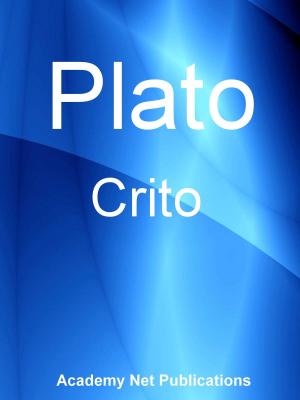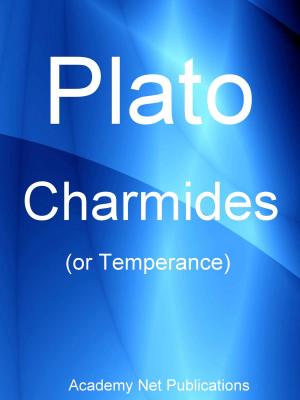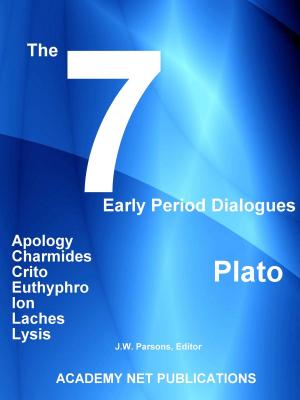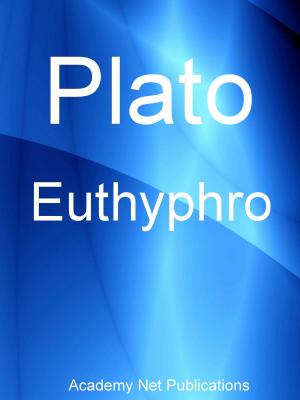Academy Net Publications: 11 books
by Aristotle
Language: English
Release Date: January 28, 2014
Language: English
Release Date: January 28, 2014
The Metaphysics is considered to be one of the greatest philosophical works. Its influence on the Greeks, the Muslim philosophers, the scholastic philosophers and even writers such as Dante, was immense. It is essentially a reconciliation of Plato’s theory of Forms that Aristotle acquired at the...
by Aristotle
Language: English
Release Date: June 16, 2014
Language: English
Release Date: June 16, 2014
On the Soul (Greek Περὶ Ψυχῆς, Perì Psūchês; Latin De Anima) is a major treatise by Aristotle on the nature of living things. His discussion centres on the kinds of souls possessed by different kinds of living things, distinguished by their different operations. Thus plants have the...
by Plato
Language: English
Release Date: May 3, 2013
Language: English
Release Date: May 3, 2013
Crito (Ancient Greek: Κρίτων [krítɔːn]; in English usually /ˈkraɪːtoʊ/ KRY-toh, also /ˈkriːtoʊ/ KREE-toh) is a short but important dialogue by the ancient Greek philosopher Plato. It is a conversation between Socrates and his wealthy friend Crito regarding justice (δικη),...
by Plato
Language: English
Release Date: May 3, 2013
Language: English
Release Date: May 3, 2013
The Charmides (Ancient Greek: Χαρμίδης) is a dialogue of Plato, in which Socrates engages a handsome and popular boy in a conversation about the meaning of sophrosyne, a Greek word usually translated into English as "temperance", "self-control", or "restraint"....
by Plato
Language: English
Release Date: May 4, 2013
Language: English
Release Date: May 4, 2013
Lysimachus, the son of Aristides the Just, and Melesias, the son of the elder Thucydides, two aged men who live together, are desirous of educating their sons in the best manner. Their own education, as often happens with the sons of great men, has been neglected; and they are resolved that...
Plato's - "The 7 Early Period Dialogues"
Apology-Charmides-Crito-Euthyphro-Ion-Laches-Lysis
Language: English
Release Date: May 2, 2013
Early Dialogues - In these dialogues, Socrates is the central character, and is believed to be expressing his own views. These are the only remaining record of Socrates' teachings; hence these are known as the Socratic dialogues. Apology (the Death of Socrates) Crito Charmides, or Temperance Laches or Courage Lysis, or Friendship Euthyphro Ion
by Plato
Language: English
Release Date: May 3, 2013
Language: English
Release Date: May 3, 2013
Socrates encounters Euthyphro outside the court of Athens. Socrates has been called to court on charges of impiety by Meletus, and Euthyphro has come to prosecute his own father for having unintentionally killed a murderous hired hand. Socrates flatters Euthyphro, suggesting that Euthyphro must be...
by Plato
Language: English
Release Date: May 4, 2013
Language: English
Release Date: May 4, 2013
The Ion is the shortest, or nearly the shortest, of all the writings which bear the name of Plato, and is not authenticated by any early external testimony. The grace and beauty of this little work supply the only, and perhaps a sufficient, proof of its genuineness. The plan is simple;...
by Plato
Language: English
Release Date: April 20, 2013
Language: English
Release Date: April 20, 2013
Plato's Phaedo is one of the great dialogues of his middle period, along with the Republic and the Symposium. The Phaedo, which depicts the death of Socrates, is also Plato's seventh and last dialogue to detail the philosopher's final days, following Theaetetus, Euthyphro, Sophist, Statesman, Apology, and Crito.
by Plato
Language: English
Release Date: April 21, 2013
Language: English
Release Date: April 21, 2013
The Symposium is a philosophical text by Plato dated c. 385–380 BC.[1] It concerns itself at one level with the genesis, purpose and nature of love, and (in later day interpretations) is the origin of the concept of Platonic love. Love is examined in a sequence of speeches by men attending a symposium,...
by Plato
Language: English
Release Date: May 1, 2013
Language: English
Release Date: May 1, 2013
The Apology is Plato's version of the speech given by Socrates as he defended himself in 399 BC against the charges of "corrupting the young, and by not believing in the gods in whom the city believes, but in other daimonia that are novel". "Apology" here has its earlier meaning...










